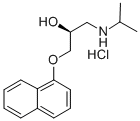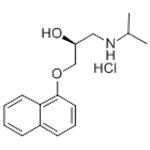Description
(S)-(-)-Propranolol is the active enantiomer of propranolol, a β-adrenergic receptor antagonist with log K
d values of -8.16, -9.08, and -6.93 for β
1, β
2, and β
3, respectively. It is also a non-specific serotonin receptor antagonist. Propanolol was one of the first β-adrenergic receptor blockers to be widely used in clinical practice for the treatment of hypertension, angina pectoris, and cardiac ischemia.
Chemical Properties
(S)-(-)-1-(Isopropylamino)-3-(1-naphthyloxy)-2-propanol hydrochloride
Uses
active enantiomer, 5-HT1 receptor antagonist
Uses
The S-enantiomer of Propranolol (P831800). β?Adrenergic blocker. Antihypertensive; antianginal; antiarrhythmic (class II).
Uses
Antihypertensor;Beta-adrenergic blocking agent
Biological Activity
More active enantiomer of the β -adrenoceptor antagonist propranolol ((RS)-1-[(1-Methylethyl)amino]-3-(1-naphthalenyloxy)-2-propanol hydrochloride ).
Biochem/physiol Actions
(S)-(?)-Propranolol hydrochloride is biologically active enantiomer. It acts as β1 receptor antagonist in thalamocortical neurons. (S)-(?)-Propranolol hydrochloride elicits its inhibitory function on the β1 adrenoceptor in trigeminovascular pain pathway and serves as a preventive medicine in migraine.
Purification Methods
The (+)-salt is the active isomer which blocks isoprenaline tachycardia and is a -adrenergic blocker. [Leclerc et al. Trends Pharmacol Sci 2 18 1981, Howe & Shanks Nature 210 1336 1966.]
References
[1] D W COSTAIN A R G. beta-Adrenoceptor antagonists inhibit the behavioural responses of rats to increased brain 5-hydroxytryptamine.[J]. British Journal of Pharmacology, 1978, 64 2: 193-200. DOI:
10.1111/j.1476-5381.1978.tb17289.x



